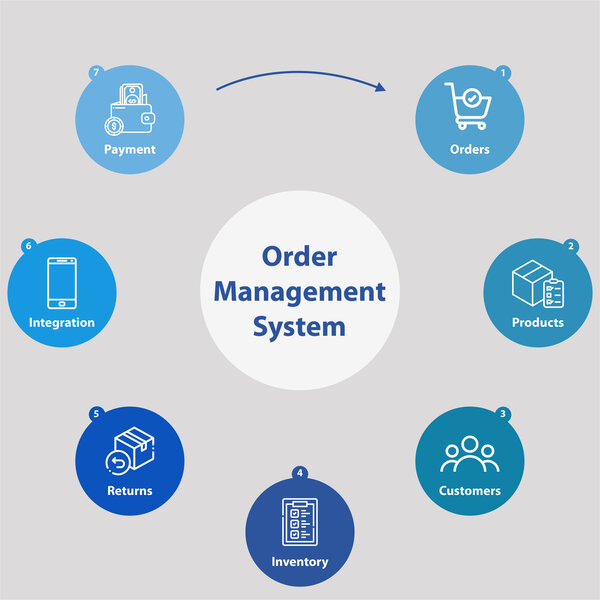Importance of Order Management Systems in Modern WMS
- Why WMSOne Stands Out In Warehouse Management - December 30, 2024
- The Future of Warehouse Inventory Management in 2025 - December 9, 2024
- Cold Storage Warehouse: Keeping Food Fresh And Safe - October 3, 2024
In today’s fast-paced e-commerce world, efficient warehousing is no longer a luxury – it’s a necessity. Gone are the days of siloed operations and manual processes. An OMS is a pivotal tool that helps businesses manage the entire lifecycle of an order, from placement to delivery. Modern warehouses thrive on streamlined workflows and real-time data, and that’s where Order Management Systems (OMS) come in.
Introduction to Order Management Systems (OMS)
Order Management Systems are comprehensive software solutions designed to manage and optimize order processing. They encompass every step of the order lifecycle, from order creation to fulfillment and after-sales service. OMS are software platforms that facilitate the management of sales orders, ensuring they are processed efficiently and accurately. These include order entry, order processing, inventory management, fulfillment, and customer service management.
Here are several key points highlighting the importance of Order Management Systems (OMS) in modern warehousing.
1. Enhanced Inventory Management
- Accurate Forecasting: By analyzing historical data and trends, OMS helps in forecasting demand, ensuring optimal stock levels.
- Real-Time Inventory Tracking: OMS provides real-time updates on inventory levels, preventing stockouts and overstock situations.
- Reduced Waste: Better inventory management minimizes wastage by tracking product expiry dates and facilitating timely rotation of stock.
2. Improved Order Accuracy and Fulfillment
- Automation of Processes: OMS automates order processing tasks, reducing human errors and ensuring accuracy in picking, packing, and shipping.
- Order Prioritization: It helps prioritize orders based on various criteria like shipping method, customer importance, or order value, ensuring timely delivery.
- Streamlined Returns Management: OMS efficiently manages returns, ensuring that returned items are quickly processed and restocked.
3. Enhanced Customer Experience
- Transparent Order Tracking: Customers receive real-time updates on their order status, enhancing transparency and trust.
- Faster Delivery: Optimized order processing leads to quicker fulfillment and faster delivery times, meeting customer expectations.
- Improved Communication: Automated notifications and updates keep customers informed at every step, reducing inquiries and enhancing satisfaction.
4. Increased Efficiency and Productivity
- Centralized Data: OMS consolidates data from various sources into one platform, providing a single point of truth and improving decision-making.
- Workflow Automation: Automation of repetitive tasks frees up staff to focus on more strategic activities, boosting productivity.
- Integration with Other Systems: Seamless integration with other systems like Warehouse Management Systems (WMS), Enterprise Resource Planning (ERP), and Customer Relationship Management (CRM) ensures smooth operations across the supply chain.
5. Scalability and Flexibility
- Adaptability to Growth: As businesses grow, OMS can scale to handle increased order volumes and complexity.
- Omni-Channel Support: OMS supports multiple sales channels, including e-commerce, retail, and wholesale, providing a cohesive approach to order management.
- Customization: Modern OMS solutions offer customization to fit specific business needs, ensuring that unique processes are accommodated.
6. Cost Savings
- Reduction in Operational Costs: Automation and streamlined processes reduce labor costs and improve resource utilization.
- Minimized Errors and Returns: Accurate order processing reduces the likelihood of costly errors and returns, saving time and money.
7. Data-Driven Decision Making
- Advanced Analytics: OMS provides detailed analytics and reporting, offering insights into order trends, customer behavior, and operational performance.
- Better Strategic Planning: With access to comprehensive data, businesses can make informed strategic decisions, improving overall efficiency and competitiveness.
- Performance Monitoring: Continuous monitoring and analysis help in identifying areas of improvement, leading to continuous enhancement of processes.
Conclusion
In conclusion, an Order Management System is essential for modernwarehousing. It streamlines operations, improves accuracy, enhances the customer experience, and supports business growth. Investing in a good OMS helps businesses stay competitive and successful in the long run. In the competitive landscape of warehousing and logistics, adopting a robust OMS is not just a luxury but a necessity for sustained growth and success.









